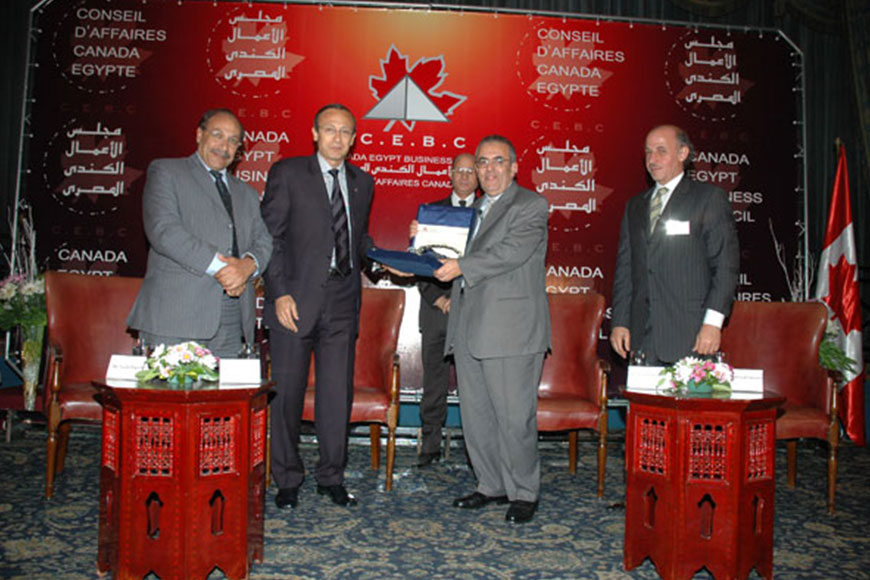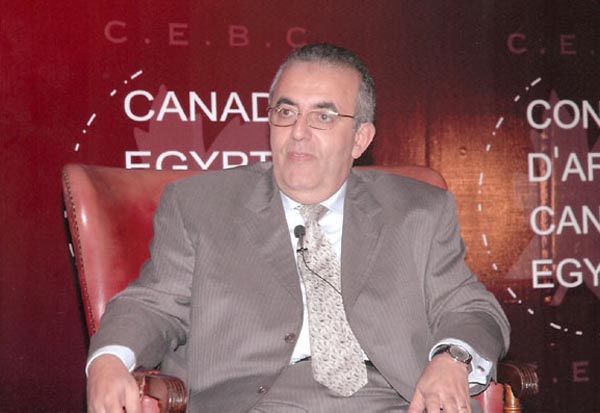
Date
Speaker(s)
Description
In a developing country of more than 72 million people. When a minister of health speaks, people tend to expect a whole sum of troubles, aches, and indicators of misery. But that was not the main trait of the event hosted by Canada Egypt Business Council with H.E. Dr Hatem El-Gabaly, Minister of Health and Population as a distinguished guest speaker.
The Minister who enjoys the advantages of being a doctor and a businessman did not delve into hackneyed stories concerning the health sector in Egypt , but what he did was more like detailing a picture that is not awfully bright but it is surly going to be with putting the right plan to work .
El-Gabaly started out by stating that Egypt faces a number of obstacles the can delay the development of the health sector. He argued that “the social security system is weak. About two thirds of the population pays for their medical treatment out of their own pockets”.
The Minister did not miss the opportunity to acknowledge that getting a quality medical service in Egypt is not an easy task, though it did improve a lot in the past 40 years. Laying out what can be described as a stark comparison; El-Gabaly said that 90 % of birth operations in the cities are conducted under a doctor’s watch, while this percentage does not exceed 40 % in the countryside or rural areas.
Pointing out the achievements, Dr. El-Gabaly said that Egypt accomplished a lot in the last 50 years in the field of general health. The expectancy at the beginning of the 60s of the last century was 41 and 43 for men and women respectively, now it is 69 and 71 respectively.
In a moment of pride, well earned off course, El-Gabaly mentioned the latest State of the World’s Mothers Report that lauded Egypt for being second only to the Czech Republic in saving the lives of children under 5. Egypt has achieved an impressive 68 percent decline in child deaths in the past 15 years. Investments in health services for mothers and children have helped improve care for pregnant women, made childbirth safer and increased the use of family planning services. As a result, thousands of children’s lives have been saved.
Putting a grim face , El-Gabaly admitted huge efforts are needed to increase Egypt’s ability to fight cancer and said that 66 % of breast cancer cases are discovered in the third or even the fourth stage compared to an outstanding 9 % in America . The Minister mentioned the mobile units that tour various Egyptian cities carrying breast check devices to help women detect the disease and collect a database. He noted that “besides the weakness of the social security system in Egypt and unjust division of the medical care service around the country, the medical sector suffers from poor quality” The Minister also addressed the medical skills issue and stressed that the nursing sector needs a great deal of attention .Dr. El-Gabaly outlined a strategy that in the process of application and said that the Ministry is applying a new rational policy that depends on using 80 % of the Ministry’s resources to develop the primary medical care .
He said that the Ministry, trying to improve this kind of service, is currently working according to a program that was recommended by the World Bank and the USAID titled “Family Medicine System”. He said, hopefully, by 2010 Egypt will have a very strong infrastructure in the medical sector. As for the nursing issue, the Ministry is reshaping and transforming the nursing schools into technical institutions and cooperating with a Birth university and 20 hospitals to enhance the effectiveness of the nursing skills. Tackling the issue of bureaucracy, he said the ministry is revamping itself in order to become a planner and an observer to oversee the performance of the many medical units and to decrease its staff (750 thousand).
Dr. El-Gabaly stressed that Egypt is going through a transitional period in which the economy is turning into a free one and noted the “social changes” that normally accompany such a change. He stated that 39 million people, (54 % of the population), have social security, but the current system was not well planned for when it was first devised. Two surveys were made in less than one year showed that less than 35 % of Egyptians are satisfied with the current social security system, while 59 % do not approve it, the Minister said.
According to the surveys, there are two main problems on the system, the first one lies in the local clinics, in which the doctors could examine up to 15 cases per hour. The other problem is the quality of the medicine which is a source of conflict with producer companies. Finally, the Minister stated that the new social security system will be applied by 2011 and would serve all Egyptians. According to Dr. El-Gabaly, the Egyptian family would pay 10 pounds monthly for the care of all its members and that such a system would include rich and poor alike.








